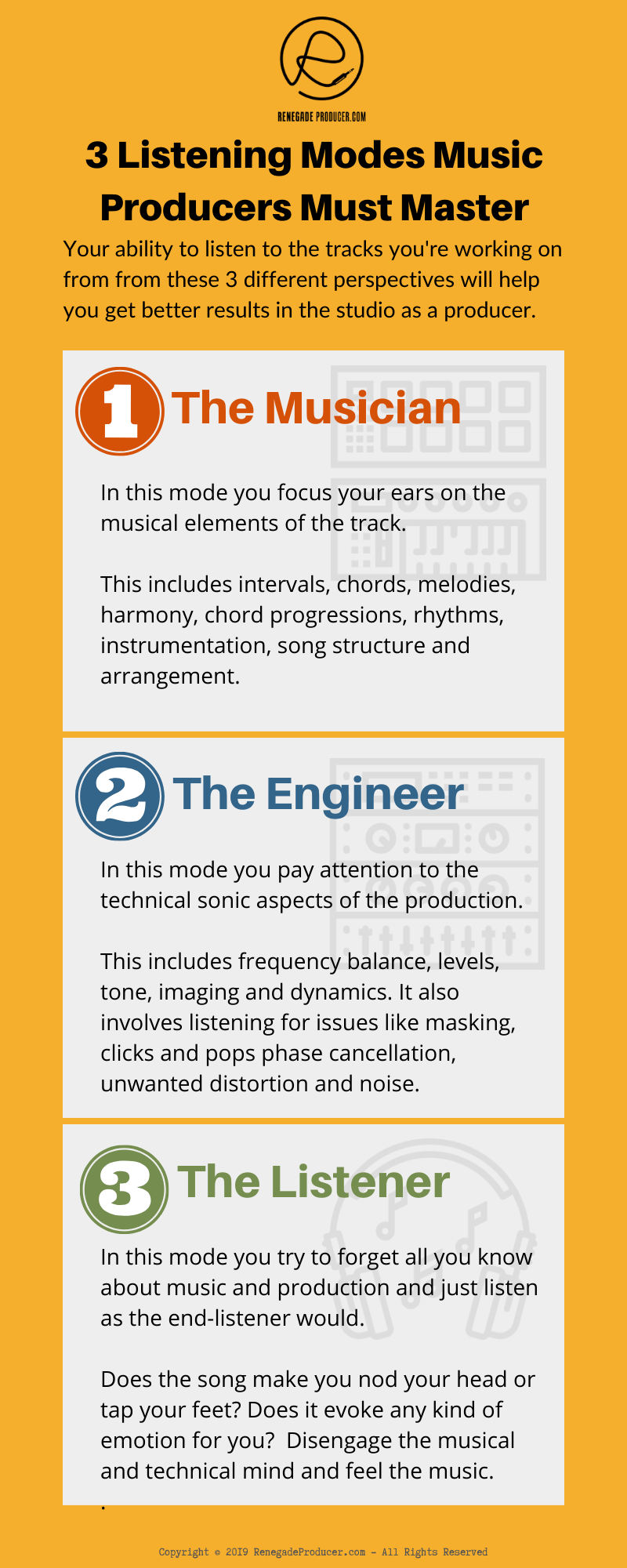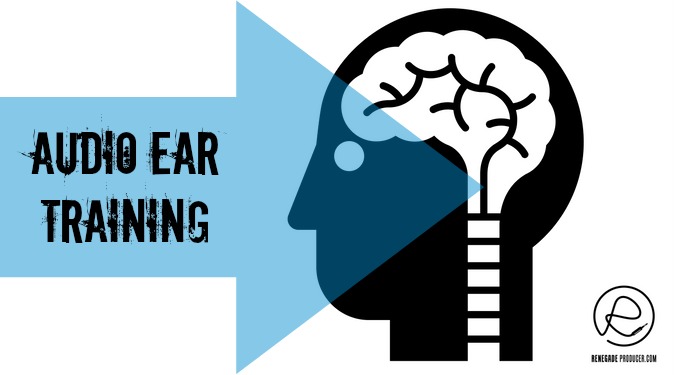To train your ears for music production, listen critically and analyze the sounds, frequencies, and arrangements in music. In addition, take ear training courses and practice identifying intervals, chords, and melodies.
Music production requires a sharp ear, which can distinguish different frequencies and identify the nuances of sound. Therefore, it is crucial to train your ears to become more attuned to the various elements of a song. To improve your listening skills, you can start by actively listening to music, breaking down the components, and analyzing each sound.
Apart from that, taking ear training courses and practicing interval recognition, chord progressions, and melody identification can also help hone your listening abilities. We will discuss how to train your ears for music production, including some practical tips and exercises to improve your listening skills.

Credit: www.renegadeproducer.com
Why Ear Training Is Important
Ear training is an essential skill for any music producer. It allows you to identify notes, chords, and rhythms more easily, which saves you time and improves the quality of your music. By training your ears, you will also be able to better understand and appreciate music in general.
Ear training is a crucial skill for any musician, especially for those interested in music production. As a producer, you need to have a critical ear for different sound elements, including tones, pitch, rhythm, and timbre. Training your ears to distinguish between various sounds is essential to producing high-quality tracks that sound professional and polished. Here are some reasons why ear training is important:
Developing A Better Sense Of Balance
As you train your ears, you develop a better sense of balance, which is especially critical in music production. You learn to balance different elements of a track, such as instruments, vocals, and effects while ensuring that each element is equally heard. Ear training helps you identify the areas of a track that might need more attention or mixing, allowing you to create a balanced mix that is pleasing to the ear.
Making Better Sound Decisions
Ear training enables you to make better sound decisions. As a producer, you need to decide which sounds to include in a track and which ones to leave out. With ear training, you can identify sounds that might not work well together, preventing mistakes and saving time in post-production. You also learn to make better decisions when it comes to processing sounds, such as equalizing, compressing, and adding effects.
Improving Communication With Other Musicians
Ear training improves your ability to communicate with other musicians, making the collaboration process smoother. With a critical ear, you can provide feedback and suggestions to other musicians, ensuring that all elements of a track are working harmoniously. Additionally, ear training helps you hear and understand different instruments and musical styles, making it easier to work with musicians from different backgrounds and genres. In conclusion, ear training is an essential skill for any music producer. It helps you create balanced tracks, make better sound decisions, and communicate effectively with other musicians. With consistent ear training, you can improve your music production skills, resulting in high-quality tracks that stand out from the rest.

Credit: www.renegadeproducer.com
Types Of Ear Training Exercises
Ear training exercises are essential for anyone looking to improve their music production skills. There are various types of exercises available, including interval recognition, chord identification, and rhythm exercises, which can all help to refine your listening abilities and enhance your overall musical awareness.
Ear training exercises are essential for anyone looking to improve their musical skills. These exercises help develop your ability to identify pitch, recognize intervals, and discern harmonic progressions. Let’s take a closer look at each type.
Identifying Pitch
Pitch is one of the most important elements of music and is essential in identifying melodies, chords, and harmonies. Ear training exercises for identifying pitch involve listening to a note and identifying its precise pitch. These exercises help you develop perfect pitch, which is the ability to identify any pitch without a reference note.
Recognizing Intervals
Intervals refer to the distance in pitch between two notes. Ear training exercises for recognizing intervals involve listening to two notes and identifying the distance between them. This skill is important in identifying melodies and harmonies.
Discerning Harmonic Progressions
Harmonic progressions are a series of chords that create the harmony of a song. Ear training exercises for discerning harmonic progressions involve listening to a series of chords and identifying the progression of the harmony. This skill is important for understanding the structure of a song and predicting the progression of the chords.
Conclusion
Ear training exercises are essential for any musician or music producer looking to improve their skills. By developing perfect pitch, recognizing intervals, and discerning harmonic progressions, you can take your musical abilities to the next level.
How To Incorporate Ear Training Into Your Practice Routine
Training your ears is vital in music production. Incorporating ear training into your practice routine involves activities such as identifying intervals, chords, and rhythms, and analyzing songs. By consistently practicing ear training, you can enhance your music production skills and create great music.
If you are an aspiring music producer or musician, then you understand the importance of having excellent listening skills. One of the most effective ways to develop your listening abilities is to incorporate ear training exercises into your regular practice routine. Ear training exercises help you improve your ability to recognize and differentiate between various elements in music such as pitch, harmony, melody, and rhythm, among others.
Start With Easy Exercises
As a beginner, it’s important to start with simple ear training exercises to build your listening skills gradually. You can begin by listening to short musical excerpts, identifying different pitches, and intervals. You can also try clapping along with rhythms or listening to and imitating specific melodies. As you progress, you can increase the complexity of the exercises by introducing chord progressions, scales, and more complicated rhythmic patterns.
Do Ear Training Exercises Consistently
Like any other skill, consistent practice is essential when it comes to ear training. Allocate time in your daily practice routine for ear training exercises, and ensure you practice each day. With consistent practice, your listening skills will improve over time, and you will develop the ability to identify various elements of music almost effortlessly.
Use Ear Training Apps And Tools
An excellent way to incorporate ear training exercises into your practice routine is to use ear training apps and tools. These tools provide interactive exercises that cover a wide range of ear training skills, including pitch recognition, interval identification, chord recognition, and rhythm. Some popular ear training apps include Auralia, EarMaster, and Perfect Ear. To summarize, incorporating ear training exercises into your practice routine is essential for developing your listening skills as a music producer or musician. Begin with simple exercises gradually and consistently practice ear training exercises each day to improve your listening skills. You can also use ear training apps and tools to enhance your learning experience.
The Future Benefits Of Ear Training
Ear training for music production has numerous future benefits, including the ability to identify subtle nuances in sound, mix tracks more effectively, and enhance overall creativity. By honing this essential skill, producers can take their music to the next level and produce high-quality tracks that stand the test of time.
Ear training may seem like a tedious and challenging task, but the benefits that come from it are worth the effort. Music producers who take the time to train their ears develop a heightened sense of musical perception, which translates into a more refined and polished sound. In this blog post, we’ll be discussing the future benefits of ear training and how it can help you develop the ability to compose, become a better music producer, and expand your overall musicianship.
Developing The Ability To Compose
One of the most significant benefits of ear training is its ability to help you develop the ability to compose. By training your ears to identify different musical elements such as chords, intervals, and melodies, you’ll have a better understanding of how different musical ideas fit together. This knowledge will give you more creative freedom as a composer and allow you to experiment with various musical styles.
Becoming A Better Music Producer
Ear training can also help you become a better music producer. As a producer, your primary job is to create music that sounds good and meets the artist’s needs. A trained ear will enable you to hear details in the mix that others might miss. You’ll be able to identify problematic frequencies, poorly balanced volumes, and other issues that can affect the overall sound quality. This ability will enable you to correct those issues and produce a more professional-sounding mix.
Expanding Your Overall Musicianship
Training your ears can also expand your overall musicianship. By developing a deeper understanding of music, you’ll be able to appreciate different musical genres and styles. You’ll be able to identify and appreciate different nuances in the music, making you a more well-rounded musician. You’ll also be able to communicate and collaborate better with other musicians and producers, creating more meaningful and polished musical projects. In conclusion, ear training is an essential skill for anyone interested in music production. It helps you develop the ability to compose, become a better music producer, and expand your overall musicianship. These skills will ultimately give you a competitive edge in the music industry and help you produce better quality music.

Credit: slidenest.com
Frequently Asked Questions Of How To Train Your Ears For Music Production
How Do You Train Your Ears For Music Production?
To train your ears for music production, you can start by practicing active listening. Focus on individual elements like melodies, basslines, and percussion. Use reference tracks, analyze spectrums, and experiment with different sounds and hardware. Consistent training and practice will improve your ability to discern and manipulate sound.
How Can I Improve My Ear For Music?
Improving your ear for music requires practice and exposure to various types of music. Active listening, focusing on different instruments and rhythms, and using tools like ear training exercises and music theory can also help. Consistency is key, so make sure to regularly engage with music and challenge yourself to identify and understand different elements.
Can A Musical Ear Be Taught?
Yes, absolutely. Musical ear can be taught through various methods such as ear training exercises, listening to different types of music, and practicing with various instruments. With consistent practice, anyone can develop their musical ear and improve their ability to differentiate between different pitches and sounds.
How Long Does It Take To Develop An Ear For Music?
It is difficult to determine an exact timeline for developing an ear for music. However, with consistent practice and exposure, one can begin to notice nuances in music over time. It also varies depending on the individual’s starting point and natural abilities.
Conclusion
It’s essential to train your ears as a music producer. It helps you to identify different elements of sound and helps you to produce better tracks. By following the above tips, you’ll be able to train your ears effectively. Try to practice listening to music every day, and don’t be afraid to experiment with different genres and sounds.
Keep your ears open, and you’ll undoubtedly see improvement over time. With consistent practice and dedication, you’ll be able to use your ears as a powerful tool for creating great music.